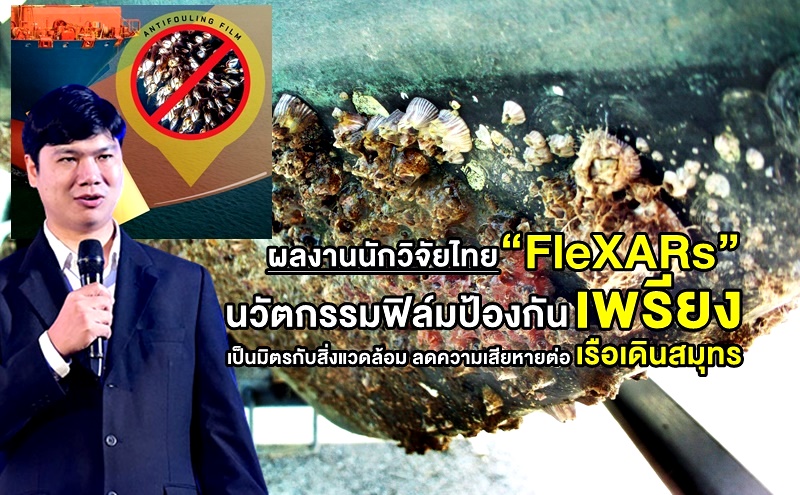The problem of barnacles sticking to the surface of ocean vessels oil rig pile and carbon steel underwater engineering structures. It is considered a global problem causing damage of up to 4.5 trillion baht annually. Operators incur enormous costs for protection and maintenance. Furthermore, the protective processes currently in use are highly toxic to the environment and dangerous to aquatic life.
National Center for Electronics and Information Technology (NETEC) National Science and Technology Development Agency (NSTDA) debut “FleXAR” (Flexas) innovative film to prevent the adhesion of living beings on the surface. environmentally friendly For use to protect the surface of marine vessels. oil rig pole and buildings in the sea
Dr. Nithi Atti, Research Group Leader, Microfluidic Surface Materials and Devices (SMD-1) Innovation, Microelectronics Technology Center (TMEC), NECTEC, NSTDA. tells the origin of the technological development that currently occurs throughout the world, especially in the nautical sector. faced a big problem from the adhesion of barnacles on ships, machines and constructions such as carbon steel Because the barnacles released to adhere to the surface of the material will form ants or small pinholes, resulting in high corrosion. Also, presence of large amount of barnacles will result in increased weight of ocean liners water resistance Causing more fuel to drive than usual Increased carbon dioxide emissions which is a major cause leading to global warming as well
These problems are well known to operators in the marine sector. However, there is no current technology that can completely solve these problems. both in terms of environmental protection efficiency and tangible price
Dr Nithi said that to solve such problems the research team collaborated with the Research Institute of Industrial Technology (ITRI), Republic of China (Taiwan) and the Fraunhofer Institute, Federal Republic of Germany. In the research and development of innovative FleXARs films with extremely hydrophobic and non-stick properties. (Superanphiphobic surface) to solve the problem of the adhesion of organisms on surfaces of upstream material. Making the mucus released by microscopic organisms unable to adhere to the surface of the material.
This new technology could be used to replace antifouling paints that endanger the lives of small aquatic animals. And it’s safer than sending divers to spray high-pressure water to get barnacles off the surface. It also does not interfere with mammalian communication as ultrasound is used to repel barnacle larvae from surfaces.
Dr. Nithi explains that in developing the FleXAR film, the research team focused on 3 main areas to make the material highly resistant. can be used in a variety of environments And suitable for production for industrial use The first part of the development is the design of a 500-micrometer robust microstructure that is strong, resistant to contact, and able to withstand external forces. By printing such patterns on materials with low surface energy, such as polydimethylsiloxane (PDMS), the surface of FleXARs films has excellent hydrophobic and oleophobic properties. The second development is the production of FleXARs films up to 30cm wide and 300m long per roll. The film is thin, transparent and flexible for easy use on large substrates. and the third is the development of a self-adhesive film back layer for easy attachment of FleXAR to substrates. Reduce installation complexity and time.
Dr. Nithi explains that pathogenic microorganisms such as bacteria, viruses and fungi require an adhesive layer or biofilm to adhere to the surface just like marine barnacles which emit slime to adhere to materials. Therefore, eliminating these factors in the first place will help reduce the buildup of bacteria as well. Tests have shown that the surface of FleXARs has a 25% reduction in bacterial buildup and biofilm formation compared to Teflon, commonly used for medical surface coatings, making the film suitable for use with medical equipment. in a hospital. This includes places with high levels of exposure, such as public transport. shopping malls, airports, especially during the outbreak of pathogens







